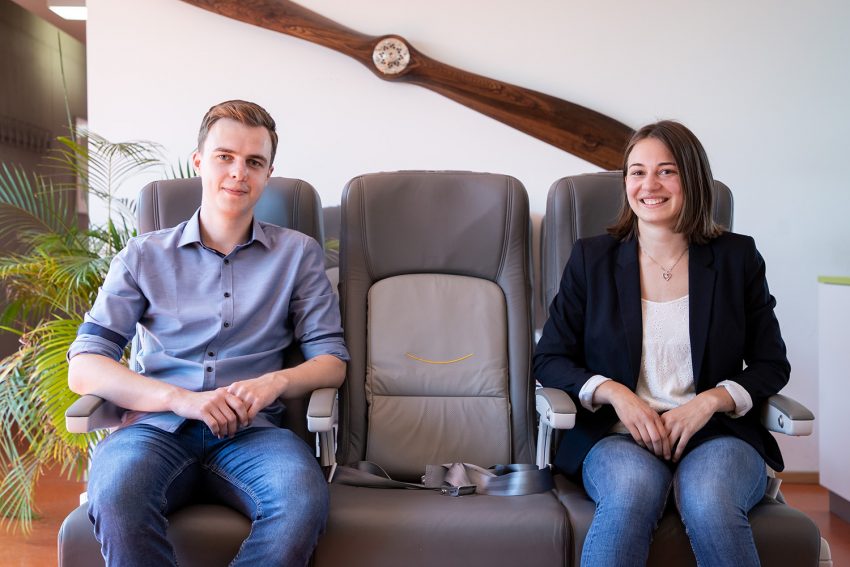Turbo Mode Two TU Braunschweig students honored at "ASME Turbo Expo" conference
The Turbo Expo of the American Society of Mechanical Engineers (ASME) is one of the world’s most important conferences in the field of turbomachinery. In addition to numerous presentations, ASME organizes a poster competition for students every year. This time, the Institute of Jet Propulsion and Turbomachinery (IFAS) of the TU Braunschweig submitted three posters. Two of them were particularly successful: after a detailed expert review, a jury awarded Tim Hertwig and Catherine Rau with first and second place; the prize money is 500 and 250 USD. Here, both briefly present their research papers with which they convinced the jury.

Tim Hertwig and Catherine Rau. Photo credit: Markus Hörster/TU Braunschweig
How were the posters developed?
Tim Hertwig: I studied mechanical engineering in my bachelor’s degree. The poster shows the contents and results of my bachelor thesis, which I wrote at IFAS last year. Currently I am studying aerospace engineering in the master’s program.
Catherine Rau: I focused on aerospace engineering in my bachelor’s degree in mechanical engineering. The poster arose from the topic of my bachelor’s thesis. I am now at the end of my master’s degree in aerospace engineering.
What are your posters about?
Catherine Rau: Aircraft engines can be damaged by sand particles and volcanic ash. This was demonstrated, for example, by the 2010 volcanic eruption in Iceland, which brought European air traffic to a standstill. In my bachelor thesis, I examined the path of such sand particles through the front part of the engine, also known as the fan stage. Using a simulation, I investigated whether and how the parameters of size, shape and particle-wall collision influence the path of the particles through the engine. My goal was to better understand the particle paths in order to provide a basis for future simulations.
Tim Hertwig: My bachelor thesis was about the effects of condensation on the operating behavior of a turbine. The turbine in question is driven by the exhaust gas from a fuel cell and drives a compressor at the inlet of the fuel cell, which compresses the incoming air and thus increases the operating pressure. As a result, the gas in the turbine is subcooled and condensation occurs. This condensation in turn has a significant effect on the turbine’s performance. For my research, numerical flow simulations were carried out in which the process of condensation was modeled using a so-called Euler-Lagrange model. The influence of condensation should be taken into account when designing future turbines for these applications and could even provide for improved power output.
How did you react to the award?
Tim Hertwig: I am particularly pleased about the award, as it is not only a great recognition of my achievements on an international level, but also contributes to the dissemination of research results. In addition, the participation offered an exciting insight into the process of a scientific publication.
Catherine Rau: I am very happy that I had the opportunity to participate in the conference thanks to IFAS. As a student, I was able to gain insights into how scientific results are published and what a conference offers in terms of diverse opportunities, such as networking sessions. The award for my poster is not only the appreciation and recognition of my scientific work at the institute, but goes far beyond that. It motivates me even more to think about a PhD after my Master. Finally, I would like to express my sincere thanks to IFAS and especially to my supervisor for the support.
